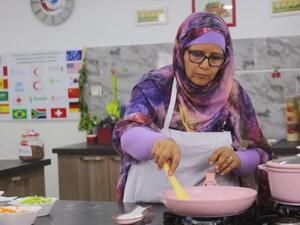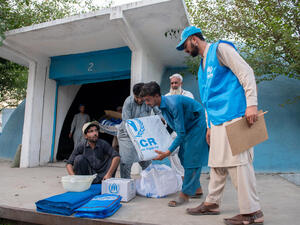UNHCR rushes aid to thousands of displaced Iraqis in remote region
UNHCR rushes aid to thousands of displaced Iraqis in remote region

Members of a displaced Iraqi family in a hotel in the city of Erbil where they found shelter after fleeing their home.
ERBIL, Iraq, June 17 (UNHCR) - A fresh influx of Iraqis displaced by the recent fighting in Iraq has arrived in the impoverished, hard-to-access region of Sinjar, on the country's western border with Syria.
A total of 20,000 people displaced by last week's violence in the cities of Mosul and Tal Afar had arrived as of Monday and another 10,000 were expected by today, UNHCR staff said. Many are living in the open in need of immediate assistance.
UNHCR and its partners have sent a shipment of relief supplies to the area, which is less accessible than most parts of the Kurdistan region of northern Iraq, where another 300,000 internally displaced people arrived over the past week.
"We understand that many of these displaced civilians are currently under the hot sun in the open, and have extremely limited access to food, water and shelter," UNHCR Senior Field Coordinator Andrei Kazakov said. "It appears that many are planning to move north to Duhok governorate. But in the meantime, we must get them the help they urgently need."
The UN refugee agency and the UN Children's Fund (UNICEF), together with local government officials, sent a 10-truck convoy to the area with emergency aid on Tuesday. UNHCR sent family tents together with emergency kits containing mattresses, blankets, kitchen sets, hygiene supplies, water containers and fans to ward of the intense heat.
Meanwhile, inside Iraq's Kurdistan region, the 300,000 Iraqis displaced by last week's fighting continue to struggle with basic living conditions. According to rapid assessment surveys carried out by UNHCR and its local partners, those surveyed report acute difficulty in finding a place to live, and complain about a high cost of living and lack of privacy.
Some say they are eating just a single meal a day to stretch out what little money they have. With daytime temperatures soaring to 40 degrees Celsius, protection from the sun and heat is becoming a major concern. Regional authorities are helping establish five temporary camps to cope with the influx of displaced Iraqis.
Fakhria is one of them. Moving her family to safety was all the 55-year-old grandmother could think of when she fled to Erbil in Iraqi Kurdistan as fighting raged in Mosul early last week. "I am old . . . I am not worried about my life," she said. "But I could never let anything happen to my grandchildren." After a rocket fell close to her family's home, Fakhria and her extended family of 18 headed north. "We walked for days under the hot sun," she said. "I sighed with relief when we reached Erbil."
Fakhria and her entire family are now living in a small room with a tiny kitchen that they are sharing with three other families. She lies awake every night, not thinking about the claustrophobic space, but the fact that she's running out of money.
"We are spending what we have very quickly," she said, adding that at this rate her savings will last for only another week. Returning to Mosul is not an option and Fakhria and her family have nowhere else to go. "I would rather sleep in the open than put my grandchildren at risk again," she stressed.
Mangora, who is about 60, feels the same way. She arrived in Erbil from the city of Tikrit with her extended family of 24 at the weekend. They spent two nights sleeping in the open before finding a single room in a rundown hotel. "We did not bring anything with us; we just ran away," she said, as her family looked on.
Until yesterday, 17 of the rooms in their little hotel in Erbil were occupied by displaced Iraqis - men, women and children from up to three families crammed in side-by-side in a single room costing US$40 a night - a discount for the displaced, she was told. Today, five of those rooms are vacant. Their occupants could no longer afford the price.
By Ned Colt, Shawn Baldwin and Rocco Nuri in Erbil, Iraq








